 |
 |
 |
 |
 |
 |
 |
 |
 |
 |
 |
Players
Ugo Ehiogu (centre-back) 2006-07
England international defender Ugo Ehiogu evidenced his top-light class
and experience in a brief loan spell at Leeds in late 2006, but he could
not revive a struggling side. His stay at Elland Road ended on 1 January
when he admitted that his body could not stand up to the rigours of playing
two games in the space of three days. Ehiogu, a Londoner of Nigerian ancestry, got his chance at the big time
when he signed professional forms for Second Division West Bromwich Albion
on 13 July 1989 following a four-week trial. He made two substitute appearances
for the Baggies over the next two years before Aston Villa manager Ron
Atkinson paid £40,000 for his services in August 1991. The deal included
a sell-on clause, which entitled Albion to 50% of any subsequent transfer
fee. Atkinson gave Ehiogu his Villa debut on 28 November 1992 at home to
Norwich, but things went disastrously, as he later acknowledged. 'I had an absolute nightmare.' Nerves? 'The opposite. Over-confidence.
After gifting Norwich two goals, I was taken off. I just wanted the ground
to swallow me up. Reading the papers for the next few days was agony and
I didn't feature in the team again for four months. But it did me a favour
because I'd never known adversity before and maybe needed to be brought
down a bit. Everybody can probably look back to a turning point in their
career. That was definitely mine.' Ehiogu's appearances over his first three years at Villa were sporadic
but in 1994 he supplanted Shaun Teale as the regular partner to Paul
McGrath, and he missed just three Premier League games in the 1994/95
campaign. Ehiogu enjoyed a long and successful career in the West Midlands, winning
a Coca Cola Cup That spring also saw Ehiogu make his international debut. After earning
5 Under-21 caps in 1992 and a B cap two years later, he was given his
full England debut against China on 23 May 1996 in a Beijing friendly.
He came on as substitute after 77 minutes for Tony Adams; England were
already three goals to the good and manager Terry Venables withdrew
Adams to safeguard his availability for Euro 96. Ehiogu did not feature again at international level until he replaced
Rio Ferdinand at half time against Spain at Villa Park on 28 February
2001; he scored the final goal in a 3-0 victory which represented a
promising dawn to the regime of Sven Goran Eriksson. The centre-back
was involved in some of the game's key incidents. He beat Iker Casillas
to a Frank Lampard corner and Emile Heskey stabbed the loose ball in
for the second goal and then Ehiogu escaped his marker to nod home his
goal from another corner with twenty minutes remaining. The shine was
taken off his performance eight minutes later when he was penalised
for fouling Javier Moreno in the area. Nigel Martyn spared his blushes
by saving the spot kick. Ehiogu won two further caps, both as sub, in August 2001 against Netherlands
and March 2002 against Italy at Elland Road. Back in the Premiership with Villa, Ehiogu suffered a fracture to his
eye socket after he got a kick in the face from Alan Shearer during
a game against Newcastle on 30 January 1999. There were fears that the
incident might cost the player his eyesight, and two operations were
required. Ehiogu: 'Two bones behind the eye were cracked in the collision, which
was purely accidental ... This is the first injury I have had in over
seven years and things looked pretty bad. 'I had raised my hopes about a possible return to the England squad.
I thought I was playing well enough to be considered, despite the fact
that Villa's results were already starting to dip in the Premiership. 'There was a crack when Shearer caught me and all the strength went from
my body. I couldn't stand up. It might have looked fairly innocuous on
television, but it was quickly assessed as a very serious problem.' Ehiogu recovered sufficiently to regain his first team place within
a few months and was a member of the Villa team that lost to Chelsea
in the FA Cup final of 2000, though his relationship with John Gregory,
who was appointed Villa manager in February 1998, was always fraught. The Independent reported in November 1999 that Ehiogu 'is to seek
guidance from the Professional Footballers' Association after his manager,
John Gregory, questioned his commitment to the club after Monday's Premiership
derby defeat at In November 2000, after 237 league appearances for Villa, Ehiogu moved
to Middlesbrough in an £8m deal. The move was nearly scuppered by the
money due to West Brom under their sell-on clause. Villa threatened to
scrap the transfer if Albion insisted on their full take and eventually
a compromise was reached on £1.25m plus 10% of the fee, saving Villa almost
£2m. Ehiogu was forced to limp out of his Boro debut after four minutes
with a hamstring injury and he was out of action for four months. He
recovered to form a sound partnership with former Villa colleague Gareth
Southgate, building the defensive foundations that helped Middlesbrough
to stave off relegation that season. On New Year's Day 2003, Ehiogu suffered broken ribs and a punctured long
after colliding with Blackburn goalkeeper Brad Friedel but he was back
in the Boro team before the end of the season. In 2004, the defender won a second Carling Cup when Middlesbrough beat
Bolton, but he missed the majority of the 2004/05 campaign with a bad
knee injury. A return to West Bromwich Albion was arranged during the January 2006
transfer window, but the move was called off amidst an injury crisis at
the Riverside Stadium. Four months later, Ehiogu was an unused sub when Boro lost the UEFA
Cup final to Sevilla with Chris Riggott retaining his place. An Achilles injury kept him out of action at the start of the 2006/07
campaign but on 23 November 2006 he was loaned out to Leeds United,
then struggling against relegation from the Championship. United had
to beat off a number of rival bids to secure Ehiogu's services. He was
still recovering from injury at the time, but manager Dennis Wise was
desperate to beat the Football League's loan deadline. Ehiogu remarked: 'There are similarities to when I first moved to Middlesbrough.
We were in a bit of a struggle, and the manager said the first season
would be tough because it was all about staying in the division. 'Nothing changes in any league in any country. You need to be hard to
beat, and you need to have your platforms in defence and midfield. Eventually,
you need to score goals to win games. Being in the position that Leeds
are, they're obviously low 'You don't become bad players overnight, but sometimes you forget little
things that just need ironing out… With that you get a bit of confidence,
you start to relax and things start to flow a little bit better. 'I could have stayed where I was and got fit. But it's not just about
fitness, it's about coming to Leeds United and improving them. There's
a bit of realisation that, under the rubble here, it's a massive club. 'My match fitness isn't what I'd want it to be, but it's not far off.
We need to make a sensible plan. I'm coming back from a major injury and
I need to make sure I don't get run into the ground. But I've also got
an input that I want to give to Leeds United. I tend to be a natural organiser
and I've got experience. 'This is my 17th year as a professional and I've played with some exceptional
players. I've been fortunate to have 15 of those years in the top flight.
Maybe I can bring on a couple of other people and raise their games. That
would be worthwhile. 'The call from Dennis and the lure of playing for a big club … is what
attracted me. There were two or three others interested but the main reason
for me was coming to Leeds - and Dennis was a big part of that.' Asked if an extended stay with Leeds would interest him, Ehiogu said:
'I'm certainly open-minded. But my aim is to get back playing in the top
flight. I'm not at a crossroads but if something came up and appealed
to me, and it was alright with Middlesbrough, then it's something I'd
have a look at. At the present minute, it's looking unlikely [that I have
a future with Middlesbrough] because of the number of centre-halves they've
got there. But you never know in football, there can be so many swings
and turns. You can't rule out anything."' Ehiogu made his United debut at Burnley on 28 November, a 2-1 defeat,
though he acquitted himself well. Phil Hay in the Yorkshire Evening Post: 'Leeds' defence was calm
and organised, and clearly improved by the addition of Ugo Ehiogu to Stack's
protective line … Ehiogu stepped into the vacancy seamlessly, and the
organisation of United's defence was unquestionable before the game swung
Burnley's way in the 52nd minute.' Ehiogu followed up by heading United's equaliser in a 2-2 draw with
Barnsley at Elland Road on 2 November, but after that fortunes declined:
he conceded an own goal in a 3-1 defeat at Stoke on 30 December, his
sixth start for Leeds, On 1 January Ehiogu returned to parent club Middlesbrough after admitting
to Dennis Wise that he could not cope with playing two matches in three
days. Middlesbrough subsequently released the defender after 126 league appearances
for the club and on 22 January 2007 he signed an 18-month contract with
Rangers. He enjoyed some initial success with the Gers and in April he
scored a spectacular goal against Celtic with an overhead kick, an effort
which was chosen as goal of the season by Ibrox fans. First team opportunities
were limited in 2007/08, however, and Ehiogu was released in January 2008,
signing for Sheffield United after making just nine appearances for the
Glasgow giants. Ehiogu suffered an injury against Wolves on Boxing Day 2008 which sidelined
him for the rest of the campaign and he was released at the end of the
season after the Blades failed to win promotion. On 3 August 2009 he announced his retirement as a player following
a brief spell on trial with League One side MK Dons. After his retirement, Ehiogu began taking coaching badges and became
involved in the music business with the indie label, Dirty Hit Records.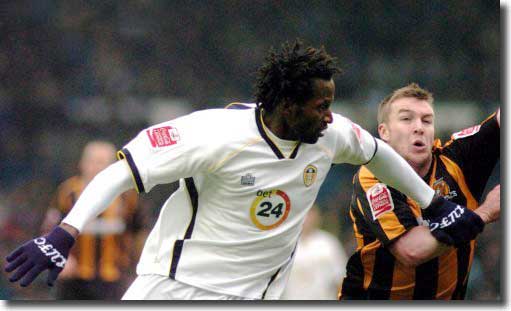 Born:
Hackney, London, 3 November 1972
Born:
Hackney, London, 3 November 1972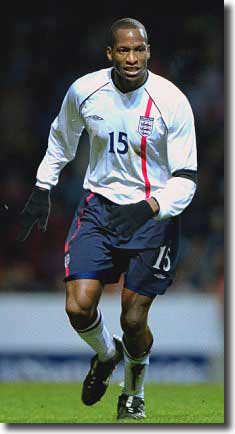 winner's
medal in March 1996 when Villa beat Leeds 3-0 in a desperately one-sided
Wembley final.
winner's
medal in March 1996 when Villa beat Leeds 3-0 in a desperately one-sided
Wembley final.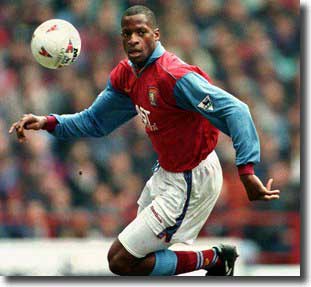 Coventry.
"The 27-year-old former England player has been battling to overcome a
calf injury sustained against Manchester United in the Worthington Cup
which has kept him on the sidelines for five matches. But, after the defeat
at Highfield Road, Gregory said: "I think Ugo would have played if
it had been a cup final. He would have wanted to play if it had been a
cup final. I'll try and convince him Saturday's match at Everton is at
Wembley. It might just wake him from his slumbers." The remark has
widened the rift between the pair which developed when the player questioned
Villa's ambition in the summer. The PFA chief executive, Gordon Taylor,
has already condemned Gregory's remarks.'
Coventry.
"The 27-year-old former England player has been battling to overcome a
calf injury sustained against Manchester United in the Worthington Cup
which has kept him on the sidelines for five matches. But, after the defeat
at Highfield Road, Gregory said: "I think Ugo would have played if
it had been a cup final. He would have wanted to play if it had been a
cup final. I'll try and convince him Saturday's match at Everton is at
Wembley. It might just wake him from his slumbers." The remark has
widened the rift between the pair which developed when the player questioned
Villa's ambition in the summer. The PFA chief executive, Gordon Taylor,
has already condemned Gregory's remarks.'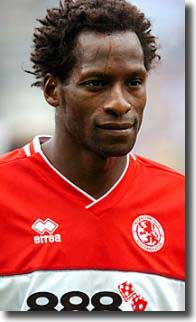 on confidence. But it's amazing what a bit of organisation and a couple
of new faces can do.
on confidence. But it's amazing what a bit of organisation and a couple
of new faces can do.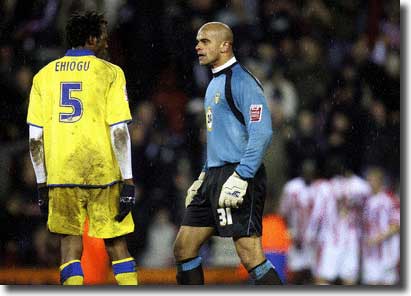 and then compounded matters with a horrendous
mix up with goalkeeper Tony Warner that left Ricardo Fuller with an
easy tap in for the third goal.
and then compounded matters with a horrendous
mix up with goalkeeper Tony Warner that left Ricardo Fuller with an
easy tap in for the third goal.